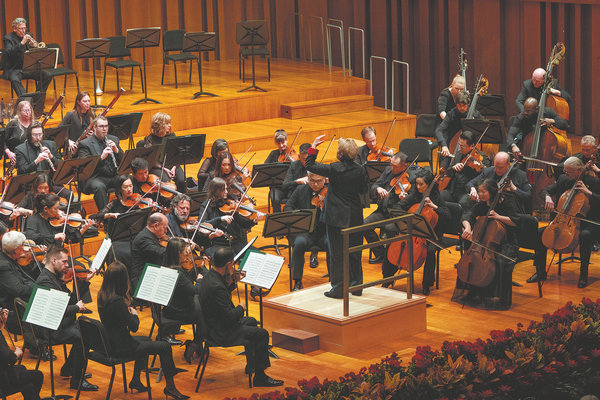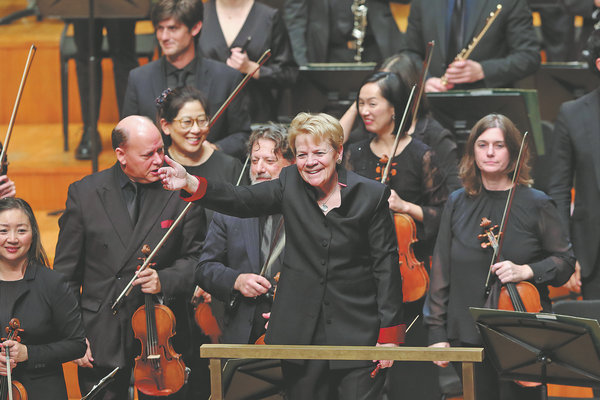A lucky 13th for Philadelphia Orchestra
By Chen Nan| (chinadaily.com.cn)| Updated : 2024-11-07
Print PrintAs the Philadelphia Orchestra returns to China on its latest tour, which began on Oct 31 and runs until the coming Sunday, it is once again making history.
The full ensemble is embarking on its first tour of the country since 2019 and its 13th overall, the most by any American orchestra.
The tour includes Beijing, Tianjin and Chengdu, Sichuan province, as well as Haikou, Hainan province, a first for the orchestra. The concerts in Haikou this coming Saturday and Sunday will be the first time an American orchestra travels to perform in Hainan province.
The program includes music from Mozart, Beethoven and Tchaikovsky as well as the debut of a commission by Grammy-winning composer Mason Bates inspired by A Moonlit Night on the Spring River, a classic Tang Dynasty (618-907) poem by Zhang Ruoxu. It made its world premiere at Beijing's National Centre for the Performing Arts on Saturday and was part of a special program featuring ancient Chinese lyrical texts set to music by composers from around the world. The performance was part of the iSing! International Festival's Echoes of Ancient Tang Poems program, which got its North American premiere with the Philadelphia Orchestra for Chinese Lunar New Year last year. During the tour, pipa (a four-stringed Chinese lute) player Wu Man and pianist George Li are performing with the orchestra as soloists.

The Philadelphia Orchestra stages the first concert of its ongoing China tour at the National Centre for the Performing Arts in Beijing, on Oct 31, kicking off its nationwide show and cultural exchange programs. [Photo by Jiang Dong for China Daily]
"We are glad to be back in China and every time we are here, we meet both old and new friends," says Matias Tarnopolsky, president and CEO of the Philadelphia Orchestra. "This is the beginning of our second 50 years of friendship. We feel the warm feedback even before we perform at concert halls."
On Oct 30, one of the orchestra's string quartets performed three short pieces at the National Museum of China, attracting crowds and receiving applause.
The orchestra's history with China dates back to 1973 when, under the direction of Eugene Ormandy (1899-1985), it became the first orchestra from the United States to perform in China since the founding of the People's Republic of China in 1949. Since then, it has returned repeatedly, developing deep, impactful connections throughout China through concerts and residencies. In November last year, 14 of its members came to China to conduct a series of residencies in commemoration of the 50th anniversary of the historic 1973 tour.
The tour's first concert at the NCPA on Oct 31 opened with the lively overture from Rossini's The Barber of Seville, which instantly infused the hall with energy and joy. The strings danced playfully, accompanied by bright woodwinds that evoked the warmth of laughter and celebration. This vibrant atmosphere set the stage for an evening of emotion and musical diversity.

Principal guest conductor Marin Alsop, who is leading the orchestra's China tour, at the concert at the NCPA in Beijing on Oct 31. [Photo by Jiang Dong for China Daily]
Following this lively start, the orchestra transitioned to Tchaikovsky's Romeo and Juliet Overture — Fantasy. Conductor Marin Alsop skillfully drew out the contrasting themes of conflict and love, beginning with a slow introduction that intensified into a dramatic portrayal of the tragic narrative. The lyrical melodies, especially the poignant love theme played on the English horn, resonated deeply, reminding listeners of the enduring power of love in music and life.
The second half featured Dvorak's Symphony No 9 in E Minor, From the New World, a piece that encapsulates both the spirit of exploration and nostalgia for one's homeland. The performance filled the concert hall with a tapestry of sounds that intertwined themes of hope and longing, taking the audience on an emotional journey.
As the official program concluded, enthusiastic applause erupted, prompting the orchestra to return for an encore of Brahms' Hungarian Dance No 5, which brought the evening to a spirited close.
"The long friendship between the Philadelphia Orchestra and China is based on mutual respect and understanding. I am very honored to be part of this tour," says newly appointed principal guest conductor Alsop, who has a 30-year history with the Philadelphia Orchestra and is leading the tour. "We also have two musicians in the orchestra this time who came to China in 1973 during that epic tour, violinist Davyd Booth and violist Renard Edwards. They shared lots of memories, which are like they happened just yesterday."
"The Philadelphia Orchestra's journeys to China demonstrate a belief in the possibility of progress through dialogue; they make real the principle that music gives voice to thoughts and ideas that words alone cannot convey," says Tarnopolsky, adding the tour also features collaborations with Chinese art institutions and young musicians.
He says that the orchestra's signature residency program has created a two-way exchange that demonstrates artistic excellence on stage and an enduring commitment to work in education and engagement.
Following the tour, a group of musicians will travel to Shanghai, Wuxi, Jiangsu province, and Nanchang, Jiangxi province, for additional residency activities, including performances with the Shanghai Philharmonic Orchestra, the Wuxi Symphony Orchestra, and the Nanchang Symphony Orchestra, as well as coaching sessions at Shanghai-Tech University, and with members of local orchestras in Wuxi and Nanchang. In Chengdu, members of the orchestra performed side-by-side with members of the Chengdu Symphony Orchestra on Wednesday.